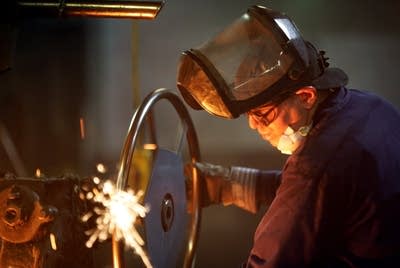At Mpls. foundry, sacrifices keep the company alive
Go Deeper.
Create an account or log in to save stories.
Like this?
Thanks for liking this story! We have added it to a list of your favorite stories.

Recessions often mean conflict between employers and unions, but the opposite story played out quietly at a Minneapolis foundry in recent months.
On the darkened floor of the Smith Foundry, workers covered in black dust carefully maneuvered a glowing pot of molten iron -- it looks like thick, liquid fire. The workers pour the iron into molds to create parts for everything from tractors to snow plows.
Bill Levercom, a shop steward, has done almost every job on the shop floor.
"You're talking 103 [degree] heat index outside the other day -- that's probably normal in here everyday," he said.
Turn Up Your Support
MPR News helps you turn down the noise and build shared understanding. Turn up your support for this public resource and keep trusted journalism accessible to all.
Workers earn an average of $18.50 per hour, and like many of the foundry's employees, Levercome has worked at the company for most of his adult life.
"Through November, December 2008, we were probably working about 60 hours a week, right 'til new years then it started dropping off," he said.
Owner Neil Ahlstrom said after January 1, the orders disappeared.
It was the fastest slow-down Ahlstrom has ever seen. Ahlstrom has worked at the foundry since he graduated from college. He bought it in 1988, from the son of the man who started the company.
By the end of January 2009, sales had plummeted 45 percent. Ahlstrom and other salaried staff took pay and health care cuts. Ahlstrom cut the foundry's hours and laid off a third of the employees, reducing its workforce to about 38, and he borrowed heavily to keep the place going.

Six months later, in June 2009, the workers' union contract expired and Ahlstrom asked them to take cuts in pay, healthcare, pension contributions and vacation -- he knew it was a lot to ask.
"It's a lot easier to have empathy for all your employees when you know their first name, their wives names, the children," Ahlstrom said. "You can't avoid it. I think the big corporations are causing a heck of a lot of negative publicity for all the hardworking people who have businesses like Smith Foundry. It's not 'take advantage of everybody and beat them up and knock them down.'"
The workers voted overwhelmingly in June 2009 to accept a one-year contract that made the cuts Ahlstrom wanted.
Alhstrom said the decision by the workers to accept the cuts kept the company going.
Scott Gelhar, with Teamsters Local Union 970, which represents Smith Foundry employees on the production floor, said they made that decision because they trusted Ahlstrom.
Gelhar said Ahlstrom took the unusual step of allowing the union some access to the company's records.
"Some employers use economic times to get concessions and never give them back or say 'good luck next time,'" Gelhar said. "In this case, Neil was forthcoming and we believed him and the men in the shop believed him. Our guys took a little heat off of Neil for a while and the end result is hopefully they'll have jobs for the next 20 years."
By the beginning of this year, business was picking up, and by the time the contract expired two months ago, Smith Foundry was back in the black.

It wasn't an easy sacrifice. Bill Levercome, the shop steward, said he lost about $20,000 in income.
When they sat down at the negotiating table in May, and Ahlstrom asked the workers to continue under the cuts for another six months, many of them balked -- including Terry Sutherlund, who has worked on and off at Smith Foundry for 25 years.
"Most of these guys aren't gamblers. They were afraid to call his bluff," Sutherland said. "They were afraid to say 'no, we won't accept what you're offering us' and see if he kept his word. So he got a pass."
In the end, most of the workers agreed that Smith Foundry needed more time to pay off debt.
In return, Ahlstrom signed a three-year contract beginning January 1 that reinstates all the workers' benefits and adds pay raises of about 5 percent over three years. He's already recalled many of the employees he laid off.
"I'm concerned about the livelihood of the employees here and that is so intertwined with the business it can't be just the business or just the employees," Ahlstrom said. "The two go hand in hand. That's the truth. That's what it's all about. "
Ahlstrom said if the recession drags on and business dips again, he won't hesitate to go back to the union and ask for another round of sacrifices.





